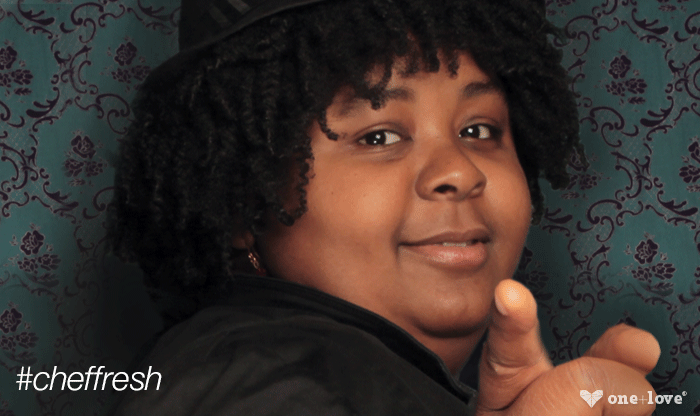
Chef Fresh Serves Up Fresh Insights on Food, Fat, and Fun
Born and raised in eastern North Carolina, Sharonmelissa Roberson (aka “Chef Fresh”) started remixing southern culinary traditions as soon as she could walk and hold a whisk. Fresh is a fat black poly dyke who now calls Chicago home, where they are opening a community cafe focusing on grassroots community development and intergenerational community-building.
An engineering and physics nerd turned chef, she has professionally studied cooking in Thailand and the U.S. and has worked in elite kitchens, including Google and Facebook. But her community-based edible activism among communities of color, elders, and youth is where her heart most deeply resides. They provide weekly meals for various non-profits and programs dedicated to increasing food access for the homeless, street youth, and seniors. She is honored to have cooked for social justice organizations such as FIERCE, INCITE, and the Young Women’s Empowerment Project.
At Fresh 82, she uses local, fresh, and seasonal items, and supports organic, sustainable agriculture as a personal chef, caterer, and cooking instructor. Fresh is a fan of fermented foods, leafy greens, ripe tomatoes off the vine, and pickled okra. They are a fat activist who loves hip hop, riding their bike ridiculously long distances, and growing their own food.
What do you wish more people would talk about when it comes to food justice?
Food is complicated. It’s not just what we eat to stay alive. Food has power. It unites us; there is a power in being able to share a meal together. Food brings healing spiritually, emotionally, and physically. Food creates a connection to the earth, animals, and it is grounding. Food is preventative care. It is a part of true universal health care concepts and most things that prescription medicine has been designed to do at an exorbitant cost. We can plant a seed in the dirt and often heal ourselves.
When we think about food insecurity and food justice we have to think beyond just feeding hungry people. I wish we would talk more about the complicated entity of food and making it sustainably accessible in this wholistic sense. Food banks are just a Band-Aid for the food justice work. They have been a critical piece in providing emergency food resources for years, but they can’t be what we rely on to feed us long-term when we talk about food justice. They are not foundational components in creating food security. We have to look at food banks and SNAP benefits and see how they are getting slashed each year and create something self-sustaining before the Band-Aid gets ripped off. I do believe in advocating for these programs to exist because we do need something to cover the wound while we’re seeking some medical attention.
I want people to talk about building local food systems. I want people to talk about who is at the table and who isn’t at the table when talking about food justice work. This can’t be our “allies” acting in the savior mentality where others decide they’re going to come in to communities and “give us what we need” or build community gardens without community members present in the work.
And lastly I’ll mention that I wish there was more talk about WHY. Why does this gap in accessibility to food exist? Why do we see certain communities and populations without consistent access? Why are decisions and policy changes often being made without those whom they directly affect being at the table? And let’s talk about the policies and systems that are in place to keep things from changing.
Where do you land in the “bad food” versus “good food” conversation?
Wow that’s tough….
Often when people refer to “bad” foods they mean “unhealthy” whereas good food is what’s “healthy.” This is problematic because it lets someone else determine the health value of certain food and it makes it moral to choose “healthy/good” foods. When we hold this morality around food, we shame people’s choices.
I hate the concept of “health” as a moral imperative. Especially because it’s accompanied by this very limited view of “health.” I hate the concept of foods being “bad” and people deeming whole groups of food as “evil.” There’s such a stigma around certain food and we often see culturally significant foods lumped into the “bad” category in communities of color. We’ve eliminated whole groups of food from our eating patterns because they’ve become “bad” in nutrition, health, dieting, etc as determined by whomever. We’ve done it with carbs, with fats–and with paleo eating plans we’re doing it with “cultivated crops.” Things that are rich or decadent are often “sinful.”
That being said…it’s hard, right? And I said it’s tough earlier because it’s a balance. Hydrogenated fats, lab-made sugars, high-fructose corn syrup do some fucked up shit to our bodies (can I say fucked up shit?). And it’s hard for me to think of these things as food that have been built in a lab to resemble our notion of food. GMOs freak me out. So how do I find a place to put these when I don’t want to fall into a “good food/bad food” dynamic? It’s tricky.
I think we have the ability to self-determine what our truth is around what works with our bodies and what doesn’t. But I don’t support the universal labeling of food as “bad” by folks in power– especially framed in fat-shaming dynamics.
How does food justice intersect with fat-positive politics? LGBTQ politics?
There is so much intersection here. We can simply look at the numbers and see that folks in poverty and are classified as food-insecure often have greater percentages of fat folks in their numbers. NIH got 1.5 million dollars last year to study why 75% of lesbians are fat. Often we get a lot of crossover between folks belonging to the LGBTQ communities and low-income folks. I’ve been doing food work with street-based queer youth for almost five years now. But beyond just the numbers we share this similar struggle, this fight for what’s just. We are all part of groups that are marginalized by society and many of us are doing work in many of these spaces.
To me this intersection seems clear as I live in a community where food is not easily accessible and I’m a fat dyke.
Have anything to say about food and self-care? Food and fun?
What don’t I have to say about food and self-care and fun?! We do so much with food–from loading up on garlic and oranges when we’re sick, to seeking out ice cream for comfort, to rolling around wrestling in jello, to making sexual sundaes on partners’ bodies with whipped cream and chocolate sauce. Damn, food is brilliant. I love it! Where else do you see that? Perhaps the only other thing I can think about with so much crossover power is music, another one of my loves.
I talk about literally using food medicinally as a part of caring for self, but food also is that comfort. That piece that takes care of our social self-care needs, the ability to break bread with each other, and share nourishing conversation. Food can take us places when we’re looking to escape. Food can reignite memories. Food can be a party of the taste buds, new flavors. It can be spicy and daring. Food can be sexy. Again, it’s a testament to that power food has.



Recent Comments